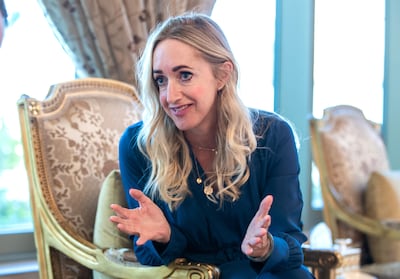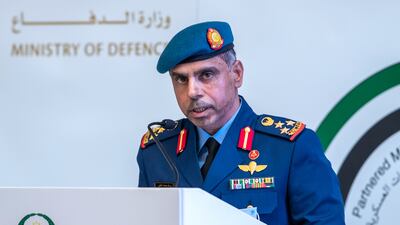The statistics speak for themselves: there are at least 40 active battlefields with 600 non-state armed groups operating around the world.
Throw into the mix 100 representatives from about 130 state militaries and you have a complex web of conflict tracked by the International Committee of the Red Cross (ICRC) over the past few years.
This is compounded by state-sponsored proxies, new technology, shifting alliances, political indecisiveness and a zero-sum game, resulting in familiar news stories about people left with nothing but the rubble of their homes.
“Across the globe there are terrible examples of where civilians are targeted, maimed and killed and livelihoods destroyed,” Clare Dalton, the ICRC head of mission to the UAE, said on Monday.
“We have to be able to look at why this is happening.”
This event is of utmost importance
Brig Salem Al Kaabi
Her comments came on the first day of a major military gathering in Abu Dhabi aimed at protecting civilians in times of war.
The UAE's Ministry of Defence and the ICRC organised the event, where more than 30 senior military officers from about 20 countries are examining how militaries can influence each other through "partnered military operations" to ensure respect for civilians and international humanitarian law.
“This event is of utmost importance,” said Brig Salem Al Kaabi, head of the Executive Department of Military Judiciary at the Ministry of Defence.
“We support everything that supports the implementation of the law. Legal advisers accompany battle commanders on the operational level but on the strategic level we have legal advisers that provide guidance on operations.”
The three-day event also aims to explore how alliances forged in the heat of battle can lessen rather than worsen human suffering.
Over the next few days, officers will discuss war scenarios, consider new tools and share feedback that it is hoped will help civilians in future conflicts.
“There will always be new ways people will find to fight war,” Ms Dalton said.
“Any situation where civilians are in some sort of danger or harm, it is a concern for us. We are trying to limit the impact it has on people’s lives and infrastructure but that’s never going to be easy.”
Conflicts in countries such as Syria and Iraq involve conventional state militaries supporting militias composed of unruly fighters whose alliances change rapidly on the battlefield.
No one person or military is in charge, exacerbating an already hostile situation for those innocent people caught in the crossfire. The task is hard.
“[Militaries] do care,” said James Seaton, global military adviser at the ICRC and a former Marine Corps commander.
“They have codes, customs and traditions. Even some of the non-state armed groups do."
“We are trying to give tools to militaries to help civilians, such as if you take down a bridge, there are electrical lines underneath. It is about understanding the second and third effects.”
The event comes three years after the ICRC and Ministry of Defence held the Senior Workshop on International Rules Governing Military Operations for the first time in the region.
Close to 150 high-ranking officers from more than 80 countries gathered in the capital at the time to discuss military rules, the rise of new technology and protecting the dignity of people whose lives have been torn apart by conflict.
It heard that the Geneva Conventions may need to be expanded to tackle the unrestricted rise of robot and cyber warfare.
The ICRC is considered the guardian of the Geneva Conventions, which set out how wars should be fought.
“If you look at conflict today there is nothing to be optimistic about,” said Ms Dalton.
She said she was hopeful things could change.
“We hear of the terrible instances where the law isn't respected but there are also examples of where militaries do their best. There are positives," she said.
"Laws need to adapt but the challenge is often agreeing on new laws."
Milestones on the road to union
1970
October 26: Bahrain withdraws from a proposal to create a federation of nine with the seven Trucial States and Qatar.
December: Ahmed Al Suwaidi visits New York to discuss potential UN membership.
1971
March 1: Alex Douglas Hume, Conservative foreign secretary confirms that Britain will leave the Gulf and “strongly supports” the creation of a Union of Arab Emirates.
July 12: Historic meeting at which Sheikh Zayed and Sheikh Rashid make a binding agreement to create what will become the UAE.
July 18: It is announced that the UAE will be formed from six emirates, with a proposed constitution signed. RAK is not yet part of the agreement.
August 6: The fifth anniversary of Sheikh Zayed becoming Ruler of Abu Dhabi, with official celebrations deferred until later in the year.
August 15: Bahrain becomes independent.
September 3: Qatar becomes independent.
November 23-25: Meeting with Sheikh Zayed and Sheikh Rashid and senior British officials to fix December 2 as date of creation of the UAE.
November 29: At 5.30pm Iranian forces seize the Greater and Lesser Tunbs by force.
November 30: Despite a power sharing agreement, Tehran takes full control of Abu Musa.
November 31: UK officials visit all six participating Emirates to formally end the Trucial States treaties
December 2: 11am, Dubai. New Supreme Council formally elects Sheikh Zayed as President. Treaty of Friendship signed with the UK. 11.30am. Flag raising ceremony at Union House and Al Manhal Palace in Abu Dhabi witnessed by Sheikh Khalifa, then Crown Prince of Abu Dhabi.
December 6: Arab League formally admits the UAE. The first British Ambassador presents his credentials to Sheikh Zayed.
December 9: UAE joins the United Nations.
More on Quran memorisation:
Muslim Council of Elders condemns terrorism on religious sites
The Muslim Council of Elders has strongly condemned the criminal attacks on religious sites in Britain.
It firmly rejected “acts of terrorism, which constitute a flagrant violation of the sanctity of houses of worship”.
“Attacking places of worship is a form of terrorism and extremism that threatens peace and stability within societies,” it said.
The council also warned against the rise of hate speech, racism, extremism and Islamophobia. It urged the international community to join efforts to promote tolerance and peaceful coexistence.
Credit Score explained
What is a credit score?
In the UAE your credit score is a number generated by the Al Etihad Credit Bureau (AECB), which represents your credit worthiness – in other words, your risk of defaulting on any debt repayments. In this country, the number is between 300 and 900. A low score indicates a higher risk of default, while a high score indicates you are a lower risk.
Why is it important?
Financial institutions will use it to decide whether or not you are a credit risk. Those with better scores may also receive preferential interest rates or terms on products such as loans, credit cards and mortgages.
How is it calculated?
The AECB collects information on your payment behaviour from banks as well as utilitiy and telecoms providers.
How can I improve my score?
By paying your bills on time and not missing any repayments, particularly your loan, credit card and mortgage payments. It is also wise to limit the number of credit card and loan applications you make and to reduce your outstanding balances.
How do I know if my score is low or high?
By checking it. Visit one of AECB’s Customer Happiness Centres with an original and valid Emirates ID, passport copy and valid email address. Liv. customers can also access the score directly from the banking app.
How much does it cost?
A credit report costs Dh100 while a report with the score included costs Dh150. Those only wanting the credit score pay Dh60. VAT is payable on top.
What%20is%20Dungeons%20%26%20Dragons%3F%20
%3Cp%3EDungeons%20%26amp%3B%20Dragons%20began%20as%20an%20interactive%20game%20which%20would%20be%20set%20up%20on%20a%20table%20in%201974.%20One%20player%20takes%20on%20the%20role%20of%20dungeon%20master%2C%20who%20directs%20the%20game%2C%20while%20the%20other%20players%20each%20portray%20a%20character%2C%20determining%20its%20species%2C%20occupation%20and%20moral%20and%20ethical%20outlook.%20They%20can%20choose%20the%20character%E2%80%99s%20abilities%2C%20such%20as%20strength%2C%20constitution%2C%20dexterity%2C%20intelligence%2C%20wisdom%20and%20charisma.%20In%20layman%E2%80%99s%20terms%2C%20the%20winner%20is%20the%20one%20who%20amasses%20the%20highest%20score.%3C%2Fp%3E%0A
White hydrogen: Naturally occurring hydrogen
Chromite: Hard, metallic mineral containing iron oxide and chromium oxide
Ultramafic rocks: Dark-coloured rocks rich in magnesium or iron with very low silica content
Ophiolite: A section of the earth’s crust, which is oceanic in nature that has since been uplifted and exposed on land
Olivine: A commonly occurring magnesium iron silicate mineral that derives its name for its olive-green yellow-green colour
What are the influencer academy modules?
- Mastery of audio-visual content creation.
- Cinematography, shots and movement.
- All aspects of post-production.
- Emerging technologies and VFX with AI and CGI.
- Understanding of marketing objectives and audience engagement.
- Tourism industry knowledge.
- Professional ethics.
FA Cup quarter-final draw
The matches will be played across the weekend of 21 and 22 March
Sheffield United v Arsenal
Newcastle v Manchester City
Norwich v Derby/Manchester United
Leicester City v Chelsea
UAE currency: the story behind the money in your pockets
Groom and Two Brides
Director: Elie Semaan
Starring: Abdullah Boushehri, Laila Abdallah, Lulwa Almulla
Rating: 3/5
57%20Seconds
%3Cp%3E%3Cstrong%3EDirector%3A%3C%2Fstrong%3E%20Rusty%20Cundieff%0D%3Cbr%3E%3Cstrong%3EStars%3A%20%3C%2Fstrong%3EJosh%20Hutcherson%2C%20Morgan%20Freeman%2C%20Greg%20Germann%2C%20Lovie%20Simone%0D%3Cbr%3E%3Cstrong%3ERating%3A%20%3C%2Fstrong%3E2%2F5%0D%3Cbr%3E%0D%3Cbr%3E%3C%2Fp%3E%0A
The Kites
Romain Gary
Penguin Modern Classics
'Peninsula'
Stars: Gang Dong-won, Lee Jung-hyun, Lee Ra
Director: Yeon Sang-ho
Rating: 2/5




